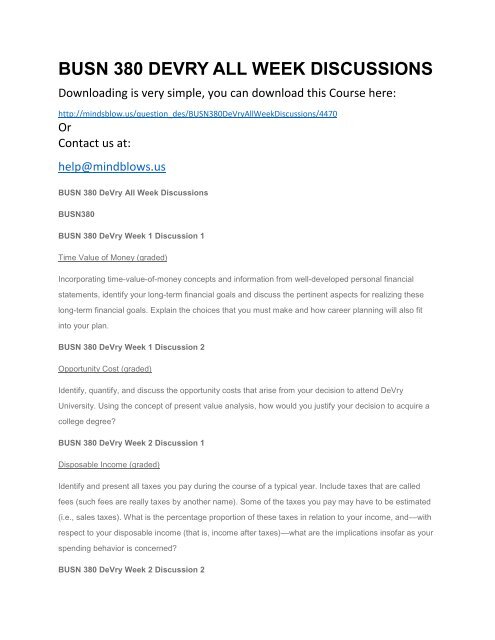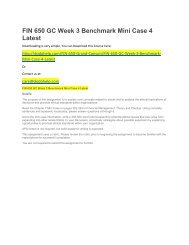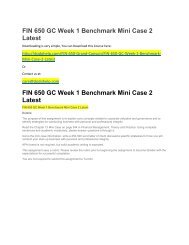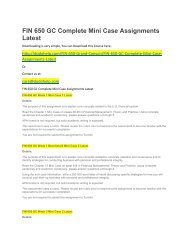BUSN 380 DEVRY ALL WEEK DISCUSSIONS
Create successful ePaper yourself
Turn your PDF publications into a flip-book with our unique Google optimized e-Paper software.
<strong>BUSN</strong> <strong>380</strong> <strong>DEVRY</strong> <strong>ALL</strong> <strong>WEEK</strong> <strong>DISCUSSIONS</strong><br />
Downloading is very simple, you can download this Course here:<br />
http://mindsblow.us/question_des/<strong>BUSN</strong><strong>380</strong>DeVryAllWeekDiscussions/4470<br />
Or<br />
Contact us at:<br />
help@mindblows.us<br />
<strong>BUSN</strong> <strong>380</strong> DeVry All Week Discussions<br />
<strong>BUSN</strong><strong>380</strong><br />
<strong>BUSN</strong> <strong>380</strong> DeVry Week 1 Discussion 1<br />
Time Value of Money (graded)<br />
Incorporating time-value-of-money concepts and information from well-developed personal financial<br />
statements, identify your long-term financial goals and discuss the pertinent aspects for realizing these<br />
long-term financial goals. Explain the choices that you must make and how career planning will also fit<br />
into your plan.<br />
<strong>BUSN</strong> <strong>380</strong> DeVry Week 1 Discussion 2<br />
Opportunity Cost (graded)<br />
Identify, quantify, and discuss the opportunity costs that arise from your decision to attend DeVry<br />
University. Using the concept of present value analysis, how would you justify your decision to acquire a<br />
college degree?<br />
<strong>BUSN</strong> <strong>380</strong> DeVry Week 2 Discussion 1<br />
Disposable Income (graded)<br />
Identify and present all taxes you pay during the course of a typical year. Include taxes that are called<br />
fees (such fees are really taxes by another name). Some of the taxes you pay may have to be estimated<br />
(i.e., sales taxes). What is the percentage proportion of these taxes in relation to your income, and—with<br />
respect to your disposable income (that is, income after taxes)—what are the implications insofar as your<br />
spending behavior is concerned?<br />
<strong>BUSN</strong> <strong>380</strong> DeVry Week 2 Discussion 2
Alternative Savings Vehicles (graded)<br />
Identify the savings (investment) instruments you use or have used in the past (if you haven’t used any,<br />
identify those that you are most likely to use). Now, identify a number of alternative savings (investment)<br />
instruments that you have not used (or are least likely to use). Compare your two lists. Analyze the tradeoffs<br />
that emerge. Why have you selected certain instruments in the past? Why may you use specific<br />
savings (investment) instruments in the future? Why will you decide to not use certain instruments in the<br />
future?<br />
<strong>BUSN</strong> <strong>380</strong> DeVry Week 3 Discussion 1<br />
Hazardous to Your Health! (graded)<br />
Using the Internet, locate a source that identifies the number of personal bankruptcies that have occurred<br />
in the United States during a relatively recent time period. Locate and report the results of Internet (or<br />
other) sources that assess the role played by credit card debt in relation to personal bankruptcies<br />
declared. What are the general conclusions regarding the effects of credit card debt upon bankruptcy<br />
filings? Do you believe that credit card debt is the only cause of bankruptcy? Are there any additional<br />
factors that can lead a consumer to make a personal bankruptcy decision?<br />
<strong>BUSN</strong> <strong>380</strong> DeVry Week 3 Discussion 2<br />
Credit Card Balances (graded)<br />
As a proportion of your personal net worth (total assets minus total liabilities), identify the proportion of<br />
credit card debt you currently have outstanding (or have had outstanding at some point in your life).<br />
Identify the expenditures that have given rise to your credit card debt. Which expenditures were<br />
discretionary and which were not? Discuss the implications. Are there any strategies that you can<br />
implement in order to better manage and reduce credit card debt? What strategies have you used?<br />
<strong>BUSN</strong> <strong>380</strong> DeVry Week 4 Discussion 1<br />
Portfolio Diversification (graded)<br />
Identify any long-term investment instruments you use or have used in the past (if you haven’t used any,<br />
identify those that you are most likely to use). Include any retirement funds established at work and<br />
pension/retirement contributions made by your employer. Assess whether or not your overall investment<br />
portfolio is efficiently diversified. Why is there a lack of diversification? What steps can you take to modify<br />
this? If you plan to invest long term, what steps will you take towards diversification?
<strong>BUSN</strong> <strong>380</strong> DeVry Week 4 Discussion 2<br />
Portfolio Risk (graded)<br />
Using the investment portfolio you identified for this week’s first discussion question, informally identify<br />
the beta for each of the asset components of this portfolio. Include your reasoning for the betas you have<br />
identified. (If you have not formally invested in a portfolio yet, find 3–5 asset components that you would<br />
want to invest in as a portfolio, and informally identify the beta for these asset components). Now, identify<br />
the overall beta of your investment portfolio and explain how you arrived at this result. What implications<br />
can you draw from this exercise? How does each component beta differ from the portfolio beta, and why?<br />
<strong>BUSN</strong> <strong>380</strong> DeVry Week 5 Discussion 1<br />
Payment Obligations (graded)<br />
As a percentage of your estimated monthly disposable income (which you identified in Week 2), what<br />
proportion is represented by your monthly automobile, mortgage, and/or rental payments? What is the<br />
percentage remaining after those monthly expenses have been deducted? Assess and discuss the<br />
implications in terms of how they influence your personal financial planning.<br />
<strong>BUSN</strong> <strong>380</strong> DeVry Week 5 Discussion 2<br />
Subsistence Spending (graded)<br />
Suppose you found yourself in a position where your monthly level of income was cut in half. Assume this<br />
misfortune will persist for the long term. Discuss the effect such a salary reduction would have on your<br />
current lifestyle. What conclusions can you draw? What changes would you make regarding your<br />
expenses and how would you implement any new financial strategies?<br />
<strong>BUSN</strong> <strong>380</strong> DeVry Week 6 Discussion 1<br />
Insurance Trade-Offs (graded)<br />
What forms of insurance coverage do you currently carry and pay for? As a percentage of your estimated<br />
monthly disposable income (which you identified in Week 2), what proportion do these coverages<br />
represent? Are there areas where you feel you are underinsured? Overinsured? What trade-offs are<br />
involved in determining the amount of insurance coverage you currently carry?<br />
<strong>BUSN</strong> <strong>380</strong> DeVry Week 6 Discussion 2<br />
Lowering Insurance Costs and Risks (graded)
What strategies might you implement to lower your insurance costs, while at the same time minimizing<br />
the risks involved in lowering such coverage? For example, in the area of health insurance, ask whether<br />
you are a smoker. In the area of auto insurance, how could your driving habits change?<br />
<strong>BUSN</strong> <strong>380</strong> DeVry Week 7 Discussion 1<br />
Zero-Based Asset (graded)<br />
U.S. Treasury bills held to maturity have a beta of zero. Why? Discuss the implications of this risk-return<br />
trade-off with respect to your overall investment portfolio as you approach retirement age. Are there any<br />
assets that you would avoid investing in as you near retirement age?<br />
<strong>BUSN</strong> <strong>380</strong> DeVry Week 7 Discussion 2<br />
Home Valuation and Estate Taxes (graded)<br />
Discuss the factors that may lead to an appreciation in the value of a home over the next 15 years.<br />
Discuss the factors that may lead to a depreciation in the value of a home over the next 15 years. How<br />
will the value of your home affect the amount of tax to which your estate will be liable subject to your<br />
death?

















